

What Are The Causes Of Teenage Pregnancy? Teenage pregnancy is defined as an unintended pregnancy during adolescence.
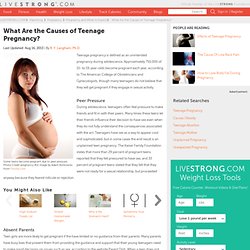
Approximately 750,000 of 15- to 19-year-olds become pregnant each year, according to The American College of Obstetricians and Gynecologists, though many teenagers do not believe that they will get pregnant if they engage in sexual activity. During adolescence, teenagers often feel pressure to make friends and fit in with their peers. Effects Of Teenage Pregnancy. Teenage pregnancy is a serious issue that may seriously impact the future of a young woman.

Any teen pregnancy will be a challenge as teens typically lack skills needed to handle a pregnancy and motherhood. Patience, maturity and ability to handle stress are required by pregnant mothers of all ages. Leymah Gbowee: Unlock the intelligence, passion, greatness of girls. J.contraception.2011.07.13. Facts on American Teens' Sexual and Reproductive Health. May 2014 •Fewer than 2% of adolescents have had sex by the time they reach their 12th birthday.
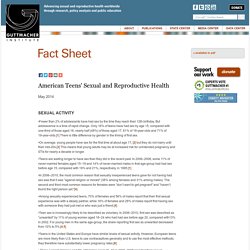
But adolescence is a time of rapid change. CDC: Abortions fall 5%, largest drop in a decade. About 18% of all pregnancies in the United States end in abortion, the Centers… (Dan Gill / For The Times ) The rate of abortions in the United States fell by 5%, the largest single-year decrease in a decade, researchers for the Centers for Disease Control and Prevention reported.
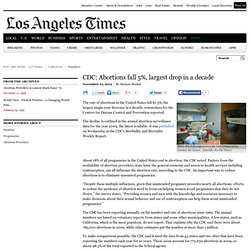
The decline is outlined in the annual abortion surveillance data for the year 2009, the latest available. It was published on Wednesday in the CDC’s Morbidity and Mortality Weekly Report. About 18% of all pregnancies in the United States end in abortion, the CDC noted. Vital statistics: Teen pregnancy fell to 'historic low' in 2011.
A doctor holds an infant's hand at Duke University Medical Center… (Stan Gilliland / Associated…) Births to women ages 15-19 and 20-24 in the U.S. declined to "historic lows" in 2011, declining to 31.3 births per 1,000 women, said researchers at the U.S.
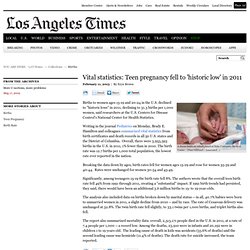
Centers for Disease Control's National Center for Health Statistics. Writing in the journal Pediatrics on Monday, Brady E. Hamilton and colleagues summarized vital statistics from birth certificates and death records in all 50 U.S. states and the District of Columbia. Teen contraception decision: Doctors say science trumps politics. Science trumped politics, but politics may still present problems for teens trying to purchase emergency contraception.
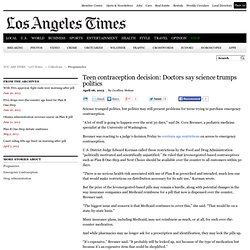
“A lot of stuff is going to happen over the next 30 days,” said Dr. Cora Breuner, a pediatric medicine specialist at the University of Washington. Breuner was reacting to a judge's decision Friday to overturn age restrictions on access to emergency contraception. Contraception Editorial January 2008: Reducing Unintended Pregnancy in the United States. By: James Trussell and L.L.
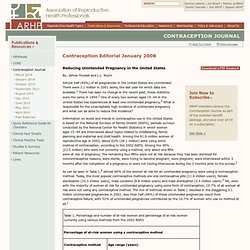
Wynn Almost half (49%) of all pregnancies in the United States are unintended: There were 3.1 million in 2001 alone, the last year for which data are available.1 There has been no change in the recent past; these statistics were the same in 1994.2 One of every two women aged 15–44 in the United States has experienced at least one unintended pregnancy.2 What is responsible for the unacceptably high incidence of unintended pregnancy and what can be done to reduce this incidence? Information on levels and trends in contraceptive use in the United States is based on the National Surveys of Family Growth (NSFG), periodic surveys conducted by the National Center for Health Statistics in which women ages 15–44 are interviewed about topics related to childbearing, family planning and maternal and child health. Among the 61.6 million women of reproductive age in 2002, about 62% (38.1 million) were using some method of contraception, according to the 2002 NSFG.
L.L.